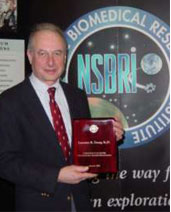HOUSTON – Dr. Laurence R. Young, former director of the National Space Biomedical Research Institute (NSBRI), was recognized recently for his leadership of the Institute during its formative years.
Young, who serves as the Apollo Program Professor of Astronautics at the Massachusetts Institute of Technology, was honored by the current NSBRI Director Dr. Jeffrey P. Sutton during the opening session of the Institute’s biennial investigator meeting held near Houston. NSBRI team leaders also recognized Young for his work.
"We are grateful to Larry for the important role he played in bringing together scientists and medical experts from leading institutions across the country," Sutton said. "His leadership enabled the research program to address the Institute’s mission to ensure safe and productive long-duration human exploration and development of space beyond Earth orbit."
Young will continue his role as a principal investigator on the Institute’s Neurovestibular Adaptation team and will serve as senior advisor to the director of the Institute.
"We have been able, in only five years, to make a substantial impact on the protection of humans in space," Young said. "Our program has introduced a new community of scientists to space research."
Young said he is proud of the Institute’s structure and growth over the first five years.
"Our success in the initial years led to NASA’s support for our expansion to the current 12 teams and 12 consortium members and to the broad national representation in the 87 projects funded through our recent grants," Young said.
The NSBRI, a consortium of 12 research institutions, focuses on research to pave the way for human exploration of space. NSBRI projects address space health concerns such as bone loss, muscle weakening, cardiovascular changes, sleep disturbances, immunology and infection, balance and orientation, radiation exposure, neurobehavioral and psychosocial issues, and nutrition, physical fitness and rehabilitation. The group is also working to develop new and remote technologies.
The NSBRI, funded by NASA, is a consortium of institutions studying the health risks related to long-duration space flight. The Institute’s 95 research and education projects take place at 75 institutions in 22 states involving 269 investigators.






